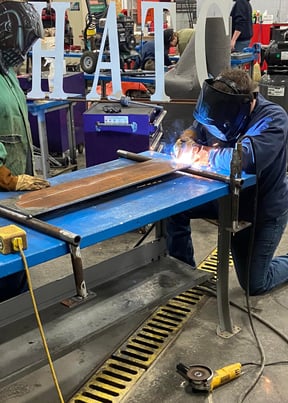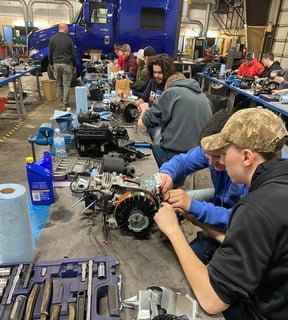CTE Curriculum
Prepare learners with CTE curriculum aligned to industry standards.
Case Study
Sparking Student Interest to Find their 'Why' in Today's Power Technology Programs
In the blink of an eye a single spark can ignite an entire engine into full motion or bind pieces of metal together creating entirely new structures. As the sparks fly, students in Mike Meissner’s power and technology classes, at Huron Area Technical Center in Bad Axe, Michigan, are preparing their knowledge and skillset to enter the workforce upon graduation. For Meissner’s students, career exploration, industry certifications and experiential learning serve as a spark for a greater purpose as they work toward their future careers.
Today, career exploration serves as a valuable tool for students to identify where their passions connect to a career, set goals and engage more intentionally in their education. Career exploration gives students the context needed to effectively plan for their futures and connect how their academics supports their professional career.
One of the pillars of career exploration is connecting the industry to academics for students. As an industry professional, Meissner uses his 10- years of experience in the power technology industry to teach his students the concepts and skills needed to be successful in the workforce. Through his small engines, diesel engines and welding, Meissner incorporates career exploration allowing students to set goals, strategize and begin obtaining competencies needed to enter the industry.
Career Exploration
At the beginning of each year, Meissner facilitates a career exploration activity where students identify a career of interest. Upon identifying a career, students research the career and determine the certifications, skills and education needed to be successful within their career of choice. For this activity, Meissner follows Mark Perna’s Career Tree Model.
The Career Tree helps students find their focus and career direction sooner, allowing them to invest in their education purposefully. The roots of the tree represent academic experiences, professional skills and career levels to a successful career. Upon completing the career exploration activity, students place a leaf on the branch of the tree corresponding with the needed requirements.
Through this project, students determine the “why” behind what they’re being asked to do within the classroom. Helping students identify the why behind educational experiences offers immense value to today’s students by allowing them to begin developing a perspective of what their career path might look like and why their education is an important aspect of their journey.
“What I’ve learned in my short time teaching is that students need to understand the ‘why’ behind what they are doing to get the most value from learning and to better plan for their futures,” Meissner said.

Career planning is an integral facet of Meissner’s program at HATC and is a process students visit frequently throughout their time in the program. Through the visual representation of goals, students are more engaged in their courses and Meissner has seen his student’s motivation for their academics increase as they are preparing for their future jobs.
Preparing Students for the Power Technology Industry
In preparation of working in the power technology industry, experiential learning is a crucial facet of student's learning experiences. Meissner structures his courses to be focused on hands-on learning while encouraging students to problem solve, experiment and explore the tools and materials familiar to their career path.
With a strong focus on hands-on learning, Meissner has arranged his shop to mimic a lab setting, similar to what is seen in the industry. Through the lab, students apply what they’re learning to hands-on skills instantaneously as Meissner works through the curriculum. Each table is equipped with safety materials, tools and materials for students to work on their projects throughout the class.
“Setting my shop up like a lab gave both me and my students a lot more flexibility when I’m teaching,” Meissner said. “I’m able to pause the video or slideshow if someone is falling behind, which helps keep us all on the same page when we’re learning something new.”
Meissner also found incorporating the lab setting has increased engagement and student-driven learning in his courses. Additionally, this format has increased academic performance and motivation to earn industry certifications within the course.
To help students exhibit their experience in the power technology industry, Meissner incorporates the Equipment & Engine Training Council (EETC) Principles of Small Engine Technology Certification in his courses.

The EETC certification validates students have acquired the knowledge and skills necessary to troubleshoot, repair, service and maintain 4-stroke small engines. Additionally, the certification allows employers to identify and connect with more skilled candidates, filling gaps in the labor market and jump-starting students’ careers.
Meissner incorporates certification work into everyday class to encourage hands-on experiences and better understand of workforce practices. Interweaving career exploration, certifications and hands-on experiences in the classroom is extremely valuable for today’s students as it not only allows them to define their career path, but also gives them a professional advantage when pursuing jobs after their academic career.
“At the end of the day, as teachers, we can teach as much as we want, but what is really valuable is showing students where their education meets the real world and helping them set goals,” said Meissner. “Today’s students have very different needs and helping them find that ‘why’ is so important in making sure they get the most out of their education.”
To help students gain the necessary knowledge and skills to be successful in their chosen field, Meissner has designed his courses to meet students’ interests and the industry’s needs. By centering his courses around career exploration, Meissner is setting his students up on a path for educational and career success. Through career exploration, hands-on learning and industry certifications, Meissner’s commitment to ignite the spark for students to determine their ‘why’ is a prime example of the value and purpose of CTE.
About iCEV
Since 1984, iCEV has specialized in providing quality CTE curriculum and educational resources. iCEV is the most comprehensive online resource for CTE educators and students, offering curriculum for several major subject areas, including agricultural science, trade & industrial education, business & marketing, career exploration, family & consumer science, trade & health science, law enforcement and STEM education. iCEV also acts as a certification testing platform for industry certifications. Recognized companies and organizations utilize iCEV as the testing platform for their certifications. Additionally, iCEV offers Eduthings, a CTE data management platform that simplifies reporting for industry certifications, work-based learning, CTSO participation, and more. For more information, visit www.icevonline.com.




